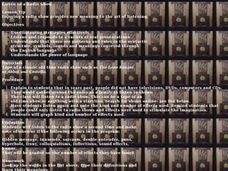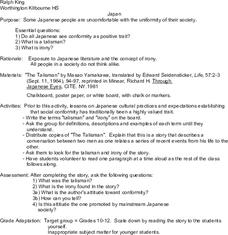Curated OER
Classic Short Stories by Kate Chopin
Students read two classic short stories by Kate Chopin and write a comparison of the stories. For this short story comparison instructional activity, students read 'Desiree's Baby' and 'The Story of an Hour' and analyze the foreshadowing...
Curated OER
Editorial Cartoons: A Historical Example of Immigration Debates
Eleventh graders analyze political cartoons. In this American History lesson, 11th graders research the Chinese Exclusion Act and the current arguments about immigration to the United States. Students create a graphic organizer...
Curated OER
Listen to a Radio Show
Learners practice the art of listening. In this listening skills lesson, students listen to an old-time radio show and identify hidden messages, innuendo, sarcasm, double entendres, puns, hyperbole, irony, colloquialisms, inflections,...
Curated OER
Beyond Chopsticks and Rice
Students explore the stereotypical American images of China. In this English and World History lesson, students read a novel to become familiar with China and its people. Students research various events in China's history and report...
Curated OER
The Gift of the Magi Lesson Plan Two
Ninth graders read, "The Gift of the Magi," discuss the multiple themes of the story and situational irony. Individually, 9th graders review questions from the study guide, explore the simile, metaphor, and allusion. Students prepare...
Curated OER
Gift of the Magi LP3
Students read the story of "The Gift of the Magi" and identify the theme and elements in the story. They discuss allusions, situational irony, simile, metaphor, allusion, irony and plot structure. Students share about sacrifices they...
Curated OER
Gift of the Magi LP2
Ninth graders read the story, "The Gift of the Magi" and identify examples of allusion and situational irony. They define and give examples of situational irony. Students plot sequence, structure, define allusion and give examples.
Curated OER
Persona Poem
Students write a poem from the perspective of the first-person persona. Through the words of the poem, demonstrate a higher level of thinking by providing insight to the personality of the poem's speaker, the "I" who is featured in the...
Curated OER
Humor and Irony in Eudora Welty's The Ponder Heart
Students demonstrate an understanding of humor in writing, specifically the use of irony (verbal, situational, and dramatic). They evaluate an event from his or her life that lends itself to a humorous retelling, and demonstrate an...
Curated OER
Music from a Place Called Half Moon
Students read the novel, Music from a Place Called Half Moon. They are assigned chapters to analyze for literary elements and to assign titles to the book chapters.
Curated OER
Three ways into the play 'Stone Cold'
Tenth graders, in groups, write pieces of a script in a particular style that they are introduced to. They also study how tension and irony work together in scripts.
Curated OER
Japan
Students read the literature of The Talisman in order to make cultural connections and investigate the concept of irony and how it is used in this Japanese text. They also discuss the issue of conformity and its relationship to the story.
Curated OER
Macbeth Presentations
Students make Powerpoint presentations or Web pages about Macbeth. Their presentations must include at least three elements from a provided list. They write reflective papers about their learning experience.
Curated OER
Are You Money Smart?
Learners figure out and discuss the irony of this coin-centric poem. They also practice persuasive letter writing, and identify and count coin/money values.















